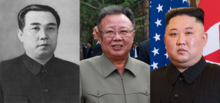Totalitarianism



Totalitarianism is a political system where a government has unlimited control.[1] In some totalitarian regimes, a dictator holds all of the power; in others, a single political party does. In all cases, the government tries to control every part of its citizens' lives, and individuals have few rights.[2][3]
Totalitarianism is a type of autocracy, and an extreme form of authoritarianism.[1]
Description
[change | change source]In a totalitarian government, there are no free and fair elections. If elections are held at all, every candidate must be approved by the government.
Totalitarian regimes do not allow people to criticize the government. They use censorship, physical force, and/or arrests against people who protest.
Events like parades and rallies are common in totalitarian governments. These suggest to the people that the ruling group is in complete control.[4]
Totalitarian governments are like police states, except that their police do not have to follow laws or regulations.[2]
History
[change | change source]In some places, totalitarianism is as old as history.[5] The Mauryan dynasty of India (c. 321–c. 185 BCE) and the Qin dynasty of China (221–207 BCE) are two early examples.[2] The Zulu Kingdom under chief Shaka (c. 1816–28) is a more recent example.[2]
Modern examples
[change | change source]During World War II, totalitarian governments existed in Nazi Germany (led by Adolf Hitler);[2] Fascist Italy (led by Benito Mussolini);[6] Spain (under General Francisco Franco);[7] and the Empire of Japan.[8]
Vladimir Lenin and Joseph Stalin led totalitarian regimes in the former Soviet Union.[9] So did Mao Zedong in The People's Republic of China.[10]
In modern times, North Korea (under Kim Jong-Un) is a totalitarian regime.[11] So is Eritrea; Isaias Afwerki has been its only president since 1993.[12]
As of 2023, fifty-nine countries had authoritarian governments.[13] These countries contain 40% of the world's population - two out of every five people on Earth.[13]
Partial totalitarianism
[change | change source]Other countries have had dictatorships which never reached full totalitarianism. At various times, many Latin American countries have had dictatorships with some aspects of totalitarianism. Some African countries (like Zimbabwe) have been dictatorships for long periods.
The satire Nineteen Eighty-Four by George Orwell was about a totalitarian society taken to extremes.
Purpose
[change | change source]Some historians say that authoritarianism "does not attempt to change the world and human nature".[14] Instead, a totalitarian regime attempts to control all aspects of people's lives, including the economy, education, art, science, private life, and its citizens' morals.[14]
Related pages
[change | change source]- Syria
- Nazism
- Fascism
- Stalinism
- Theocracy
- Adolf Hitler
- Ante Pavelić
- Dictatorship
- Antisemitism
- Communism
- Joseph Stalin
- Khmer Rouge
- Ion Antonescu
- The Holocaust
- Authoritarianism
- Bosnian Genocide
- Cambodian Genocide
References
[change | change source]- ↑ 1.0 1.1 Pruitt, Sarah (2024-05-22). "What's the Difference Between Authoritarianism and Totalitarianism?". HISTORY. Retrieved 2024-10-31.
- ↑ 2.0 2.1 2.2 2.3 2.4 "Totalitarianism | Definition, Characteristics, Examples, & Facts | Britannica". Encyclopedia Britannica. Retrieved 2024-10-30.
- ↑ Conquest, Robert 1999. Reflections on a ravaged century. p. 74. ISBN 0-393-04818-7
- ↑ John A. Armstrong 1961. The Politics of Totalitarianism. New York: Random House.
- ↑ Hannah Arendt 1951. The Origins of Totalitarianism. New York: Random House.
- ↑ Gentile, Emilio (2008). "Fascism and the Italian Road to Totalitarianism". Constellations. 15 (3): 291–302. doi:10.1111/j.1467-8675.2008.00492.x. ISSN 1467-8675.
- ↑ Payne, Stanley Fascism in Spain, 1923–1977, pp. 347, 476. 1999. Univ. of Wisconsin Press
- ↑ Fifield, Anna (2017-11-17). "Life under Kim Jong Un". The Washington Post.
- ↑ Riley, Alexander (1 October 2019). "Lenin and His Revolution: The First Totalitarian". Society. 56 (5): 503–511. doi:10.1007/s12115-019-00405-1. ISSN 1936-4725. S2CID 203447806.
- ↑ Pei, Minxin (2021). "China: Totalitarianism's Long Shadow". Journal of Democracy. 32 (2): 5–21. doi:10.1353/jod.2021.0015. S2CID 234930289.
- ↑ Fifield, Anna (2017-11-17). "Life Under Kim Jong-Un". The Washington Post.
- ↑ "2022 Country Reports on Human Rights Practices: Eritrea". United States Department of State. 2022. Retrieved 2024-10-31.
- ↑ 13.0 13.1 "Democracy Index 2023". The Economist Intelligence Unit. Retrieved 2024-10-31.
- ↑ 14.0 14.1 Carl Friedrich and Z.K. Brzezinski 1967. Totalitarian dictatorship and autocracy. Harvard University Press.